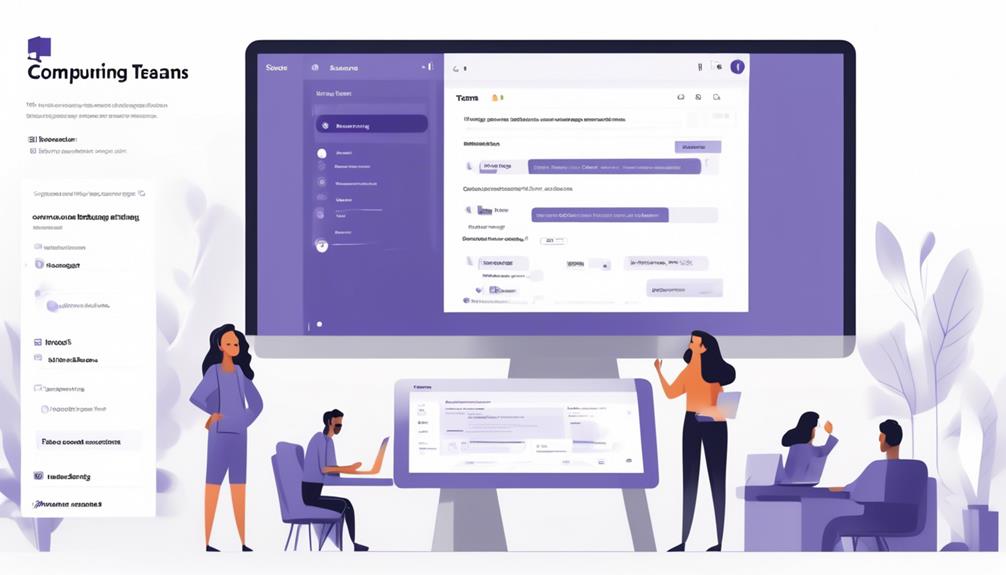Let’s be honest – in the digital world, privacy concerns are rampant, and Microsoft Teams is no different. We’ve all experienced meetings where sensitive conversations occur, and the idea of someone recording without our knowledge is worrisome.
But can it actually happen? The answer isn't as straightforward as one might think, and the implications reach far beyond the virtual meeting room.
So, what are the rules and regulations governing this ethical minefield, and what measures can be taken to protect the rights of participants?
Key Takeaways
- Organizations must assess the legal implications of recording Teams meetings and should consult legal professionals to ensure compliance with data protection regulations.
- Recording a Teams meeting without obtaining explicit consent violates privacy rights and undermines trust and transparency.
- Familiarity with privacy laws and legal frameworks is necessary to ensure compliance and safeguard personal data in virtual meetings.
- Managing recording options in Microsoft Teams, such as customizing meeting policies and enabling participant notifications, upholds privacy standards and respects participants' consent.
Legal Considerations for Recording Teams Meetings
We must carefully assess the legal implications of recording Teams meetings to ensure compliance with data protection laws and regulations. With Microsoft Teams' new setting allowing control over recording consent, it's essential for organizations to understand the legal considerations for recording meetings.
This policy setting, which can be applied to specific or all users in Microsoft 365 tenants, requires meeting organizers to obtain explicit consent from participants, addressing privacy concerns and promoting transparency. This not only demonstrates respect for privacy but also aligns with data protection regulations.
By considering the legal aspects of meeting recordings, organizations can prevent unauthorized recording and support compliance with privacy laws. However, it's crucial to recognize that laws regarding data protection and privacy vary by jurisdiction. Therefore, consulting legal professionals to understand local regulations is imperative for ensuring compliance.
Organizations need to navigate the complexities of privacy and data protection laws to establish clear guidelines for recording Teams meetings, promoting a culture of respect for individuals' privacy rights and upholding legal standards.
Ethical Implications of Recording Without Consent

Navigating the legal considerations for recording Teams meetings leads us to confront the ethical implications of capturing meetings without consent. Recording meetings without consent raises significant ethical concerns that need to be carefully considered.
Here are three important ethical implications to ponder:
- Respect for Privacy: Recording a Teams meeting without consent violates the privacy of the participants involved. It can lead to feelings of distrust and discomfort among team members, ultimately affecting collaboration and productivity.
- Trust and Transparency: Failing to obtain consent for recording meetings undermines the principles of trust and transparency within a team. It can create an atmosphere of suspicion and erode the trust that's essential for effective teamwork.
- Respect for Individuals' Rights: Every participant in a Teams meeting has the right to control their own image and words. Recording without consent disregards this right and can lead to infringement of personal and professional boundaries.
As professionals, it's imperative to uphold ethical standards in the use of technology, including the recording of Teams meetings. Respecting privacy, fostering trust, and honoring individual rights should be central to the ethical considerations surrounding recording meetings without consent.
Understanding Privacy Laws in Virtual Meetings
Privacy laws in virtual meetings require careful consideration and adherence to ensure the protection of participants' personal information. Understanding the intricacies of privacy laws is paramount in upholding the rights of all individuals involved.
When conducting virtual meetings, it's essential to be well-versed in the privacy laws that govern such interactions. This includes being familiar with the legal requirements for obtaining consent to record meetings and the specific regulations that pertain to the handling of personal data.
Comprehending privacy laws involves more than just a cursory understanding; it necessitates a comprehensive grasp of the legal frameworks and regulations that apply to virtual meetings. Familiarity with privacy laws ensures that the Teams meeting policy aligns with legal requirements and respects the privacy rights of all participants.
It also involves implementing appropriate measures to safeguard personal data and ensuring compliance with data protection regulations.
Managing Recording Options in Microsoft Teams

When managing recording options in Microsoft Teams, it's essential to understand the various settings available to ensure compliance with privacy laws and meeting participants' consent. In a Teams meeting, the ability to record is a useful feature for capturing important discussions and decisions.
Here are three key considerations for managing recording options in Microsoft Teams:
- Meeting Policies: Customize meeting policies to control who can start or stop recording in a Microsoft Teams meeting. Adjusting these policies allows for greater control over the recording process and ensures that only authorized individuals can initiate or terminate recordings.
- Participant Notifications: Enable participant notifications to inform all attendees that a Microsoft Teams meeting is being recorded. This ensures transparency and provides an opportunity for participants to voice any concerns or objections before the recording commences.
- Storage and Access: Clearly define the storage location for recorded Microsoft Teams meetings and manage access permissions. This step ensures that recorded content is securely stored and only accessible to authorized individuals, thereby safeguarding privacy and confidentiality.
Understanding and effectively managing recording options in Microsoft Teams is crucial for upholding privacy standards and respecting participants' consent.
Participant Rights and Consent in Meeting Recordings
Upon joining a Teams meeting, participants should be informed and given the opportunity to provide explicit consent before any recording begins. Respecting participants' rights and privacy is crucial, and explicit consent ensures that all individuals are aware of and agree to the recording of the meeting. To illustrate the importance of participant rights and consent in meeting recordings, we've provided a table below outlining key considerations for organizers and participants in Teams meetings.
| Organizers | Participants |
|---|---|
| Must obtain explicit consent before initiating a recording. | Should be informed of the recording and given the opportunity to provide consent. |
| Have the responsibility to ensure compliance with local regulations regarding recording consent. | Have the right to decline participation in a recorded meeting if consent is not provided. |
| Can control recording consent through the new setting in Teams meeting policy. | Should be aware that unauthorized recording without consent violates privacy and security. |
| Should seek legal advice to understand local regulations and avoid legal consequences. | Have the right to seek recourse if their consent is not obtained before recording. |
Understanding and respecting participant rights and consent in meeting recordings is essential for maintaining trust and compliance with privacy regulations in Teams meetings.
Frequently Asked Questions
Can a Teams Meeting Be Recorded Without You Knowing?
Yes, a Teams meeting can be recorded without your knowledge, raising privacy concerns and potential legal implications. It's essential to recognize the importance of obtaining explicit consent before recording meetings to respect participants' privacy.
Unauthorized recording violates privacy and security protocols, potentially leading to legal consequences. Implementing policies that prioritize consent and privacy fosters transparency and compliance with data protection regulations.
Can You Prevent a Teams Meeting From Being Recorded?
We prioritize privacy concerns and understand the legal implications of recording settings. Consent requirements are paramount, and we've ensured that participants have control over their audio and video being recorded.
Our mastery in this area allows us to provide more control over recorded content. We recognize the importance of complying with local laws and regulations regarding recording, and we've implemented measures to address these concerns.
Can You Record a Teams Meeting if You Are Not the Host?
We must address privacy concerns and legal implications when considering recording a Teams meeting without consent. Consent requirements and ethical considerations are crucial in this matter.
It's essential to respect participants' privacy and comply with data protection regulations. Unauthorized recording violates privacy and security. Microsoft Teams has built-in security features to prevent this.
Organizations should adhere to local laws and consult legal experts to ensure compliance.
Can the Company Secretly Record Teams Meetings?
Yes, the company can't secretly record Teams meetings. Doing so could have severe legal implications and would violate employee rights.
It's crucial to prioritize privacy and obtain explicit consent from all participants before recording any meeting.
This approach not only ensures compliance with privacy regulations but also fosters a more respectful and secure meeting environment for all involved.
Conclusion
In conclusion, it's crucial to understand the legal and ethical implications of recording Teams meetings.
By respecting privacy laws and obtaining consent from all participants, we can ensure a secure and compliant meeting environment.
Microsoft Teams provides options to manage recordings, but it's our responsibility to use them ethically.
Let's remember to prioritize privacy and security in our virtual meetings to create a respectful and trustworthy environment for all participants.










